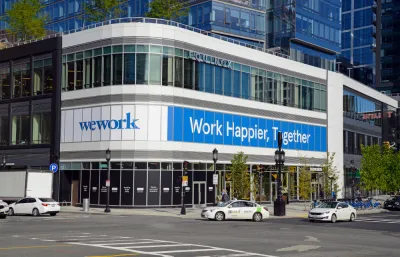The company that best understands what drives city residents’ decisions is best suited to untangle persistent urban problems.

What kind of mindset and expertise, and thus what type of company, is best suited to succeed in the growing merger between tech companies and city management? The We Company and Lyft both recently dove headlong into the complex world of urban problem solving, following in the footsteps of Alphabet (who has has already tried their hand with Sidewalk Labs in Toronto) and Airbnb (who opened their own internal urban planning shop, Samara, in 2016). The fundamental challenges that We Company and Lyft were designed to solve will take them in different directions.
To summarize recent news, in conjunction with their recent IPO, Lyft has launched an initiative called City Works (which if you operate in the field, you will immediately confuse with a thousand other similarly named organizations). According to press releases, City Works will donate $50 million or 1% of Lyft’s profits, whichever is greater, to cities around the country to support local transportation initiatives that improve equity and access.
Taking a different approach, The We Company (née WeWork) has hired a fleet of designers to extend its reach beyond the walls of its work spaces (or fitness centers, or any of the other recent spinoffs) into the city at large. Leadership additions include Di-Ann Eisnor, formerly the head of growth at Waze and known for an analytical bent, and architect and big thinker Dror Benshetrit, known for creative, if outlandish, proposals. These new hires arrive on the heels of bringing in starchitect Bjarke Ingels as the company’s chief architect. No shortage of big thinkers. As compared to Lyft, it’s less clear what The We Company is aiming to achieve with these additions.
While both companies will clearly be using data captured from users to identify efficiencies (Lyft already tracks its users’ travel patterns and The We Company recently acquired spatial analytics company Euclid, which tracks movements inside buildings), there is a fundamental difference between Lyft and The We Company.
Lyft’s primary business is solving an engineering problem: where people travel and how they get there. Of the range of choices that people in cities make on a daily basis, the most rational one—the one most similar to an engineering problem—is how to travel. While a minority will choose a route based on view, or the pleasantness of the experience, the vast majority of city dwellers look at the information available to them and choose how to get from A to B based exclusively on trip length. Which is to say that people’s commute decisions differ from almost every other complex, abstract, and social decision that they make all day long. Transportation decisions are the exception to the rule of human nature.
The We Company, on the other hand, is in the business of creating communities. The primary benefit they offer is a (partial) solution to loneliness and dislocation. For all the freedom that freelancing offers, the one thing it eliminates is a collegial work environment. Hence co-working’s rapid rise—it re-creates the social benefits of an informal office environment without the negatives of a hierarchy. And in the service of improving their product, The We Company pays very close attention to the messier side of human decision making. What attracts people to congregate in certain places in an office or building? Is it the layout, the activities on offer, the types of people nearby, or other amenities? Acquiring Euclid gives The We Company fine grained information to help untangle exactly that.
In their search for the magic to the secret sauce of human congregation, The We Company is far better suited to improve cities, because the question they’re asking is far more complex and anthropological than Lyft's. The fundamental crises that cities face today are not infrastructure-based, they are the sticky social and emotional problems that revolve around equity and insecurity and fairness: policing, persistent segregation of schools and communities, and gentrification, to name a few. Lyft will undoubtedly be able to make a positive impact through their donations and collaborations—god knows cities haven’t mastered access issues yet—and they should be applauded, but the approach they bring with them from inception will only take them so far.
The We Company, on the other hand, is merely scaling up. Instead of untangling social interaction on a small, office-sized, scale, they are applying what they’ve already learned to a larger but similar target. It will be tempting to follow the tech herd and get lost in the data, especially with their acquisition of Euclid, and The We Company should be careful not to be lured into believing that data aggregation will unlock the secret to vibrant cities. They should stick with what they know best from their existing body of work: that the complexity and delight of cities comes from the overlay of millions of people making far more complex emotional decisions about what makes them feel good.
Lev Kushner is a founding partner at Department of Here, an urban brand strategy agency that helps give definition and meaning to the places people care about.

Analysis: Cybertruck Fatality Rate Far Exceeds That of Ford Pinto
The Tesla Cybertruck was recalled seven times last year.

National Parks Layoffs Will Cause Communities to Lose Billions
Thousands of essential park workers were laid off this week, just before the busy spring break season.

Retro-silient?: America’s First “Eco-burb,” The Woodlands Turns 50
A master-planned community north of Houston offers lessons on green infrastructure and resilient design, but falls short of its founder’s lofty affordability and walkability goals.

Test News Post 1
This is a summary

Analysis: Cybertruck Fatality Rate Far Exceeds That of Ford Pinto
The Tesla Cybertruck was recalled seven times last year.

Test News Headline 46
Test for the image on the front page.
Urban Design for Planners 1: Software Tools
This six-course series explores essential urban design concepts using open source software and equips planners with the tools they need to participate fully in the urban design process.
Planning for Universal Design
Learn the tools for implementing Universal Design in planning regulations.
EMC Planning Group, Inc.
Planetizen
Planetizen
Mpact (formerly Rail~Volution)
Great Falls Development Authority, Inc.
HUDs Office of Policy Development and Research
NYU Wagner Graduate School of Public Service




























